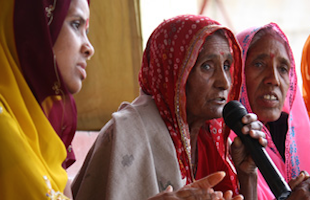
There is much to celebrate, this International Women’s Day. The empowerment of women is gaining ground globally, more girls are in school and the world is mobilizing to ensure that they have a healthier and safer future to reach their full potential. However, despite these successes, millions of women still face barriers and inequalities in many areas of their lives, including in health. This is evident in the battle women face against tuberculosis (TB).
The burden of TB for women
TB is one of the top killers of women worldwide. In 2013, more than half a million women lost their lives to this deadly disease and over three million women fell ill with TB. Of all HIV-related deaths globally, around half were among women. Almost 90% of these deaths were in Africa, where TB is estimated to have claimed more women’s lives than men.
The HIV epidemic, poverty, gender inequality, food insecurity, population growth and socio-cultural barriers to accessing health care increase women’s vulnerability to TB. They often face greater stigma and discrimination due to TB than their male counterparts which can greatly exacerbate their social and economic insecurity.
TB in women is also responsible for increased illness and death in children. It has been associated with a six-fold increase in risk of perinatal death and a doubling of premature birth and low birth-weight. Evidence shows that TB increases the risk of HIV transmission from infected women to children. Moreover some studies show that in pregnant women living with HIV, TB increases the risk of maternal and infant mortality by almost 300%. TB thus creates orphans, impoverishes families and adversely affects economic and social development.
Breaking barriers to end TB
In 2014, the World Health Assembly approved the new WHO End TB Strategy which has ambitious targets, and envisions a world free of TB. The Strategy outlines actions for governments and partners to provide patient-centred care, pursue policies and systems that enable prevention and care, and drive research and innovations needed to end the epidemic and eliminate TB. Empowering women will be critical for the success of the Strategy and to reach the goal of ending the TB epidemic. More women in affected communities and women’s advocates need to be engaged in efforts to design and enhance access to TB services for women. TB prevention, diagnosis and treatment should form core components of health interventions for women, particularly along their reproductive life cycle. This is vital, especially in high HIV and TB burden settings in Africa. Human rights and equity challenges should be effectively addressed while rolling-out the Strategy to ensure that socio-cultural barriers and stigma are effectively eliminated, providing women access to high-quality care, free of catastrophic costs and social repercussions.
“As we celebrate women’s empowerment on this International Women’s Day”, said Dr Mario Raviglione, Director of WHO’s Global TB Programme, “all of us working to end TB must commit to do much more to engage women in affected communities and, through them, enable equitable access to care. More than half a million women dying of TB each year, largely because of poor access and discrimination, is something outrageous that we must correct urgently".
